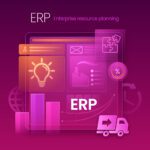Introduction: Understanding ERP Software
In today’s fast-paced and competitive business environment, the need for seamless integration across various departments is more critical than ever. Enterprise Resource Planning (ERP) software provides businesses with a comprehensive solution to streamline operations, increase efficiency, and enhance productivity. Whether you are a small startup or a large corporation, ERP systems play a vital role in managing and automating business processes.
This article will delve into what ERP software is, the key features it offers, its benefits, and how it can revolutionize the way businesses operate.
What is ERP Software?
ERP (Enterprise Resource Planning) software is a suite of integrated applications that helps organizations manage their core business processes. These systems collect, store, manage, and interpret data from various business activities, including accounting, procurement, inventory management, HR, and customer relations. ERP software provides a unified platform that allows different departments to communicate with each other, ensuring that all information is up-to-date and easily accessible.
Historically, ERP systems were limited to large enterprises. However, the growth of cloud technology has made ERP solutions more accessible and affordable for small and medium-sized businesses.
Key Features of ERP Software
1. Financial Management
One of the core features of ERP systems is financial management. ERP financial management modules provide tools for managing company finances, including accounts payable, accounts receivable, general ledger, and financial reporting. With real-time data access, companies can monitor their financial health, track expenses, and ensure compliance with tax laws.
Key capabilities include:
-
Budgeting and forecasting
-
Profit and loss statements
-
General ledger integration
-
Regulatory compliance
By automating financial tasks, ERP systems help reduce errors and increase the accuracy of financial data.
2. Inventory Management
Inventory management is another critical feature of ERP software, especially for businesses involved in manufacturing or distribution. ERP systems help businesses track stock levels, manage warehouse operations, and automate reordering processes.
Key features of ERP inventory management include:
-
Real-time stock updates
-
Order management and tracking
-
Supplier management
-
Integration with procurement and sales modules
With these features, businesses can minimize stockouts, reduce excess inventory, and optimize their supply chain.
3. Human Resource Management (HRM)
The HRM module in an ERP system helps streamline HR operations by managing employee records, payroll, benefits, and performance. By automating HR functions, businesses can reduce administrative workload and ensure compliance with labor laws.
Key features of ERP HRM include:
-
Employee data management
-
Payroll processing
-
Recruitment and onboarding
-
Performance management
-
Employee self-service portals
ERP systems also enable businesses to better manage training, benefits, and time off, ensuring that HR processes are efficient and accurate.
4. Customer Relationship Management (CRM)
The CRM module within ERP software helps businesses manage interactions with customers, track sales leads, and monitor customer satisfaction. By centralizing customer data, businesses can provide better customer service and develop more targeted marketing strategies.
Key features of ERP CRM include:
-
Contact management
-
Lead and opportunity tracking
-
Sales forecasting
-
Customer support management
By leveraging ERP CRM functionalities, companies can improve customer retention and drive sales growth.
5. Supply Chain Management
Supply chain management in ERP software enables companies to optimize their supply chain from procurement to delivery. This feature includes tools for managing suppliers, production, logistics, and distribution.
Key features include:
-
Supplier relationship management
-
Demand forecasting
-
Production planning
-
Shipment tracking and delivery management
By improving supply chain visibility, ERP systems help businesses respond more quickly to market changes, reduce costs, and improve customer satisfaction.
6. Manufacturing Management
For companies involved in manufacturing, ERP systems provide tools to streamline production processes. The manufacturing management module helps businesses manage production schedules, monitor equipment performance, and optimize resource allocation.
Key features include:
-
Production planning and scheduling
-
Shop floor control
-
Quality control
-
Maintenance management
By automating these processes, businesses can reduce production delays, improve product quality, and enhance operational efficiency.
7. Business Intelligence and Reporting
ERP software provides businesses with business intelligence tools that offer actionable insights into their operations. With real-time data analysis and reporting features, organizations can monitor key performance indicators (KPIs), track progress towards goals, and make informed decisions.
Key features include:
-
Customizable dashboards
-
Real-time data analysis
-
Forecasting and trend analysis
-
Automated reporting
These features help businesses stay competitive by enabling data-driven decision-making across various functions.
8. Project Management
Project management features in ERP software help organizations track the progress of projects, manage resources, and ensure timely delivery. These tools are especially useful for businesses that manage complex projects with multiple stakeholders.
Key features include:
-
Task assignment and tracking
-
Resource allocation
-
Budget tracking
-
Project scheduling
-
Risk management
By integrating project management into an ERP system, companies can ensure that projects stay on schedule and within budget.
9. Procurement Management
ERP software helps businesses streamline their procurement processes by automating purchasing, supplier management, and invoicing. This ensures that companies can procure goods and services efficiently and maintain strong relationships with suppliers.
Key features include:
-
Supplier selection and management
-
Purchase order creation
-
Invoice matching
-
Spend analysis
By automating procurement processes, businesses can reduce procurement cycle times and increase efficiency.
10. Sales and Order Management
The sales and order management features of ERP systems help businesses track sales from initial order through to delivery. By centralizing order data, companies can manage inventory levels, ensure timely deliveries, and reduce order errors.
Key features include:
-
Sales order processing
-
Order tracking
-
Pricing and discount management
-
Returns and refunds processing
By integrating sales and order management, ERP systems help businesses improve customer satisfaction and ensure efficient order fulfillment.
Benefits of Using ERP Software
1. Improved Efficiency and Productivity
ERP software helps automate manual tasks, which leads to greater efficiency and productivity. Employees no longer need to manually input data across multiple systems, allowing them to focus on more strategic activities.
2. Centralized Data Access
One of the main advantages of ERP systems is the centralization of data. By providing a single source of truth, ERP systems eliminate data silos, enabling employees to access up-to-date and accurate information when needed.
3. Better Decision-Making
With real-time access to critical business data, ERP systems enable decision-makers to make more informed and timely decisions. The business intelligence and reporting tools available in ERP software also provide deeper insights into business operations.
4. Cost Savings
By streamlining operations and automating tasks, ERP systems help businesses reduce overhead costs, minimize waste, and optimize resource utilization. These cost savings can be reinvested into the business for growth and innovation.
5. Enhanced Collaboration and Communication
ERP software improves collaboration across departments by providing a shared platform for communication and data sharing. This leads to better coordination, faster decision-making, and fewer misunderstandings.
6. Scalability
ERP systems are designed to grow with your business. As your company expands, you can add new modules or functionalities to meet your changing needs. This scalability ensures that the ERP system remains valuable as your business evolves.
Challenges of Implementing ERP Systems
While ERP systems offer numerous benefits, implementing them can present challenges. These include:
-
High upfront costs: ERP systems can be expensive to implement, particularly for small businesses.
-
Complexity: ERP systems require careful planning and customization to ensure they align with a business’s needs.
-
Resistance to change: Employees may be resistant to adopting new systems, which can hinder the successful implementation of ERP software.
-
Data migration: Migrating existing data to the ERP system can be time-consuming and complex.
Conclusion: Why ERP Software is Essential for Modern Businesses
In conclusion, ERP software offers businesses a powerful tool for managing and automating their operations. With features that span across finance, inventory, HR, sales, and more, ERP systems enable businesses to operate more efficiently, make better decisions, and improve collaboration across departments.
As businesses grow, the scalability and flexibility of ERP systems make them indispensable tools for success. Despite the challenges that come with implementing ERP, the long-term benefits far outweigh the initial investment, making it a critical component of any modern business strategy.






